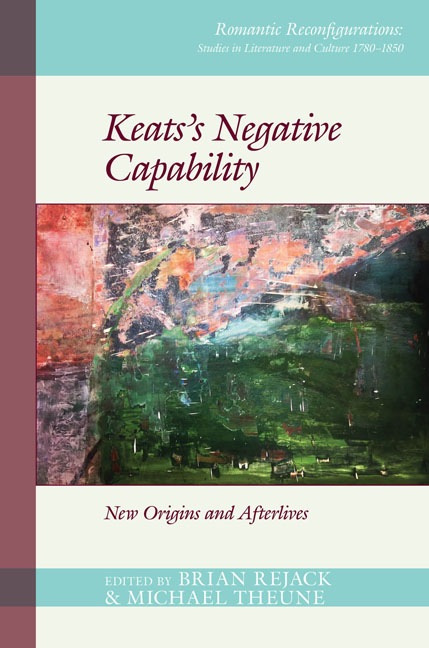Book contents
- Frontmatter
- Contents
- List of Figures
- Acknowledgments
- List of Abbreviations
- List of Contributors
- Preface
- Introduction: Disquisitions: Reading Negative Capability, 1817–2017
- Part I ‘swelling into reality’: New Contexts for Negative Capability
- Part II ‘examplified throughout’: Forms of Negatively Capable Reading
- Part III ‘pursued through Volumes’, Volume I: Negative Capability in Twentieth- and Twenty-First-Century American Poetry
- Part IV ‘pursued through Volumes’, Volume II: Adaptations, Appropriations, Mutations
- Afterword: Reading Keats's Negative Capability
- Bibliography
- Index
3 - Keats's ‘Negative Capability’ and Hazlitt's ‘Natural Capacity’
- Frontmatter
- Contents
- List of Figures
- Acknowledgments
- List of Abbreviations
- List of Contributors
- Preface
- Introduction: Disquisitions: Reading Negative Capability, 1817–2017
- Part I ‘swelling into reality’: New Contexts for Negative Capability
- Part II ‘examplified throughout’: Forms of Negatively Capable Reading
- Part III ‘pursued through Volumes’, Volume I: Negative Capability in Twentieth- and Twenty-First-Century American Poetry
- Part IV ‘pursued through Volumes’, Volume II: Adaptations, Appropriations, Mutations
- Afterword: Reading Keats's Negative Capability
- Bibliography
- Index
Summary
We are still getting to know mercurial Keats. Keats's friends knew this Keats very well, but he was largely lost in the course of his Victorian reception. Keats states, ‘there are two distinct tempers of mind in which we judge of things—the worldly, theatrical and pantomimical; and the unearthly, spiritual and etherial’ (LJK, I: p. 395). Employing Keats's binary we can see that Keats was kept etherial by serious, etherial minds. The twentieth century's increased critical attention to Keats has certainly made us more alert to Keats's worldliness and theatricality. With the application of a much wider variety of theoretical perspectives to a broader array of increasingly accessible materials—including, especially, the numerous important biographies and Rollins's edition of the letters—we can see more clearly what one of the great biographers calls Keats's ‘ready humor’, which ‘could be earthy … was certainly direct … [and] had an element of farce’, and we can hear more clearly his ‘unconscious mimicry’. We are more greatly attuned to and prepared to receive Keats's hoodwinkings and embarrassments, his epistolary dynamics and the productions of his often boyish imagination. In fact, we should expect such playfulness, whether unconscious or conscious. As Christopher Ricks notes, ‘Keats's mind, so alertly prefigurative, was especially liable to puns and portmanteaux, often of course quite premeditatedly; his letters are full of conscious effects of which Lewis Carroll or James Joyce would have been proud.’
But this Keats, who comes to us trailing ethereal clouds of unearthly spirituality, is still only coming into focus—sometimes, even as he's right before our eyes. Ensconced in Rome approximately a month after his quarantine in Naples, Keats makes the terrible confession to Charles Brown that he feels as though he is ‘leading a posthumous existence’ (LJK, II: p. 359). This certainly is a moment of grave self-awareness, a terrifying (and heroic) acknowledgment of the state of things. But it is also a pun. Keats, exiled to Italy, away from his beloved Fanny Brawne, is leading a life like that of Posthumus, the character from Shakespeare's Cymbeline, who is exiled to Italy and so separated from his beloved Imogen. This connection should not be surprising.
- Type
- Chapter
- Information
- Keats's Negative CapabilityNew Origins and Afterlives, pp. 47 - 59Publisher: Liverpool University PressPrint publication year: 2019



